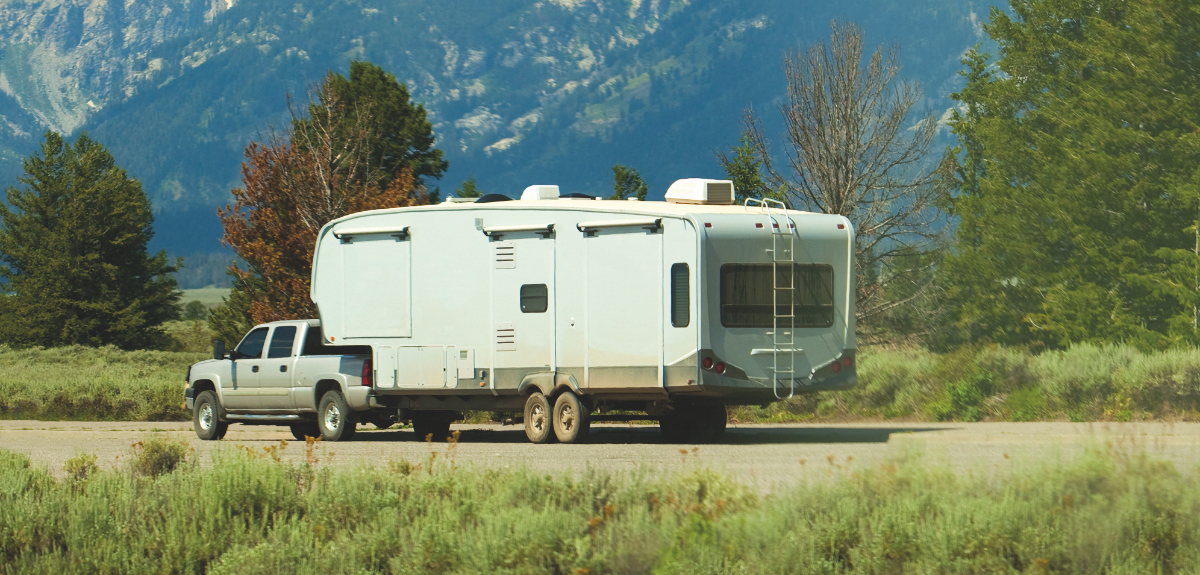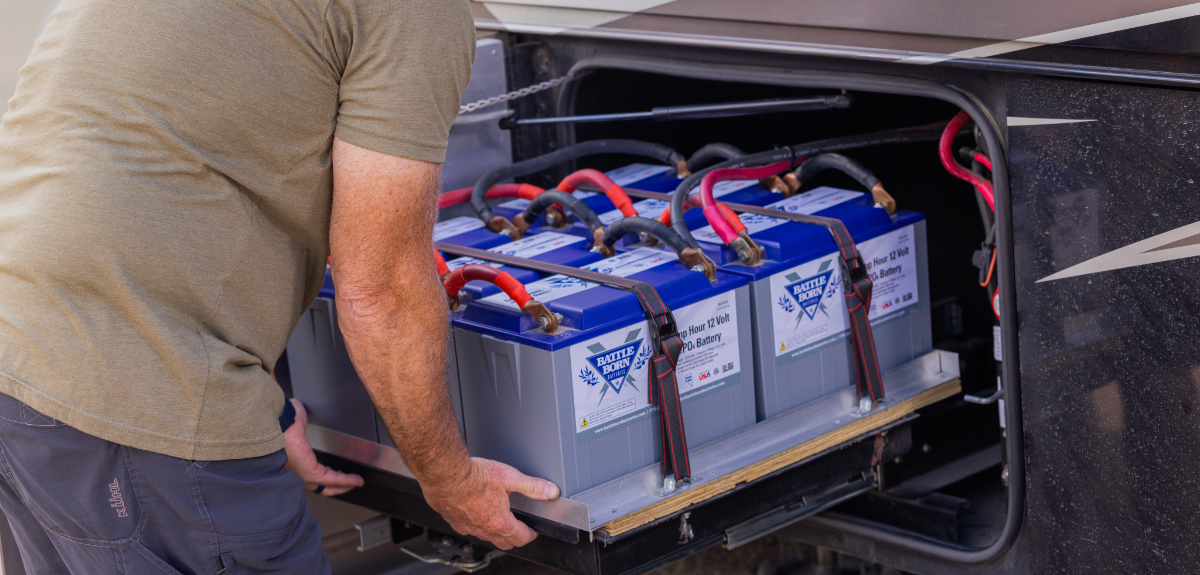Tech Q&A — February 2023
Battery Math, Winterizing with Air, a Missing Trailer, and Power Problems
Image Caption:
Battery Drain Problem
Q: We have a 2019 Fleetwood Bounder 35K Class A motorhome that we bought new. It has a 100-watt solar panel on the roof, a 5.5-kW Onan generator, and four 6-volt gel-cell batteries. The batteries are wired in pairs in series to make 12 volts, then coupled in parallel for 400 amp-hours (Ah) at 12 volts. e inverter is a Magnum. The batteries were put in new last year.
Our RV came with a large three-door, residential-style refrigerator. Whenever we camp where there is no shorepower, the batteries go below the shutoff setting on the inverter, which I think is set at around 10.5 or 11 volts. This seems to be a common problem. We don’t leave anything else on that would consume any significant power, and the fridge is not opened overnight, so it should not be consuming that much power. The refrigerator is a Samsung, and the label inside the door says 3 amps at 115 volts. I think that is about 30 amps at 12 volts? This seems to me to be a rather low consumption.
One thing I am not clear about: I think as the battery pack drains, at some point, the inverter shuts down. Camping World service in Las Vegas set this when they put in the new gel cell batteries. I think it is set around 11.5 volts. What I cannot seem to find is at what point in the consumption of the 400Ah batteries do they reach this voltage. I am pretty sure you don’t get all 400Ah before the inverter/converter shuts down. Maybe you can shed some light on this.
Also, from what I have read, the refrigerator does not run a lot when it’s closed for the night. We are not late-night people, typically retiring around 9 p.m., and when I get up around 6 or 7 a.m., the Magnum is typically showing low battery and is off, as is the fridge, as it has no power. The minute I fire up the generator, it comes right back on. Also, I know this fridge must use a whole lot more amps when it kicks on. I think that 3 amps on the label might be some average consumption over time with some nominal usage.
There seem to be a lot of complaints from RVers who try to camp without shorepower and have these large residential fridges. One last note, when my wife and I retire for the evening, other than maybe watching a bit of TV earlier, there is nothing else that I am aware of consuming any sizable amount of power.
—Ed McCormick, Las Vegas, Nevada
A: This breaks down into a math problem. Let’s start with the electrical current load. Assuming the fridge is truly drawing only 3 amps at a nominal 120 volts, that would convert to 30 amps at 12 volts. But inverters are, at best, only 85–90% efficient, so the system needs to draw at least 33–35 amps from the batteries just to get the 30 amps at 12 volts of power to the inverter for the fridge. That’s with nothing else at all being drawn from the batteries (which is unlikely).
Deep-cycle gel batteries should not be discharged below 50–80% of their rated capacity per use cycle for maximum longevity, depending on the manufacturer’s recommendations. So you need to get this information from the battery manufacturer (since you didn’t provide the make and model). A 100% fully charged gel cell battery should measure about 12.65 volts at rest with no load. About 12.35–12.40 is considered a 50% charge. When it gets down to 12.0 or less, it is considered fully discharged. Long story short, you have been deeply discharging the batteries.
Using a conservative 50% depth of discharge, the batteries are down to 200Ah available for everything on the coach, including lights, TV, water pump, etc. However, since the batteries have been deeply discharged beyond the recommendations, they probably can’t provide full-rated capacity (they need to be tested).
Let’s say they now have 150Ah available. Drawing 35 amps for 4.3 hours would bring the batteries down to 50%. The Las Vegas region tends to be hotter than average across the country, so expect the fridge to draw more current trying to cool it. This pretty much explains why the batteries are having this problem. If you intend to dry camp often, the solution is probably to get a fridge that runs on propane as well as electricity.
You can also add more solar panels to your rig’s solar charging system. Try around 400 watts of extra panels and make sure the charge controller can handle the extra load. That factory-stock 100-watt panel is a nice start but not enough to do much good for a large battery array such as the one your RV has. The additional panels will be charging the batteries all day long, so you’ll start the evening battery drain with full batteries.
Missing Trailer?
Q: We recently purchased a 2017 Ford Expedition. Although the trailer is hitched up and connected, the brake control module insists it is missing. Will the brake lights and turn signals still operate correctly even if the module says the trailer is missing? I can’t drive and run along behind the camper to see what is working or not. This issue is so frustrating.
—Bob and Ellie, via email
A: The “Trailer Disconnected” error message on the dash with a Ford factory brake controller is usually related to an issue with the blue brake output wire that runs from the brake controller to the 7-way trailer connector at the rear of the vehicle. Start with inspecting and cleaning both the truck and trailer sides of the 7-way connector. Next, if cleaning doesn’t fix the problem, inspect the blue wire coming from the back of the Ford’s 7-way connector and follow the wire as far as you can toward the cab. Look for any frayed, damaged or pinched sections that need to be repaired.
There could also be a ground problem on the trailer, but only check for this if the methods just mentioned haven’t solved the problem. Try checking the main ground wire at the connector as well as the wires coming from the brakes, particularly where they go through axle housings. Make sure the grounds are all attached to clean, bare metal surfaces on the trailer that is free of any corrosion. You’re going to have to find someone to check the lights for you. You could also back up toward a large storefront plate-glass window at night.
Also, test the brakes to make sure you can apply them strongly enough to skid the tires. For daily driving and towing, you’ll want the brake controller set just under the point that the tires will skid, but it’s good to know the power is there if you need it. Sometimes trucks with this problem lose trailer brake effectiveness. You can also check the light functions by yourself, of course, with the engine running and the parking brake set: Turn on the turn signals and running lights and walk back and take a look.
Ford has a software update, which seems to cure some of these problems, and there is also a Ford Technical Service Bulletin (TSB no. 182106 dated 29 March 2018) that applies to this problem.
Electrical Power Problem
Q: We have a 2020 Thor Hurricane 34R Class A motorhome bought new, and it has less than 5,000 miles on the odometer. From the first time we camped, both air conditioners shut off on their own. When we turn them back on with no problem, they will run for about 3–4 hours, then shut off again. We have pets, so we have to limit our time away. The water heater does the same thing, and last time camping when the air conditioners shut off, so did the lights.
We use 50-amp outlets at campgrounds, and we have a surge protector. We did not have to reset the circuit breaker at the campground to get the power back on. Please help; we just retired and plan to travel with our pets.
—Susan Schoeller, Adrian, Georgia
A: The fact that you didn’t have to reset the campground circuit breaker makes me think it was an auto-resetting surge protector causing the problem. You didn’t mention what make and model air conditioners you have; does yours have this feature? Do you monitor the voltage in the RV to see if it is too low?
Campground power is sometimes overtaxed, and voltage drops, causing A/C motors to overheat and shut off. If the coils on the rooftop A/C system become frozen over (this happens more often in humid areas), it can also cause the RV air conditioner to turn on and off repeatedly. You simply need to leave the unit off until they thaw out or keep in it Fan mode. It can happen from a dirty air filter, and during humid days, depending on the temperature the A/C unit is set on. However, the fact that the lights and water heater shut off leads me back to the surge protector.
Using 120-Volt Adapters
Q: Can I plug a 50-amp-to-15-amp reducer adapter into my home 50- amp outlet to run the Norcold refrigerator in my RV? I want to use the home 120-volt power to run the refrigerator.
—Charles Raymond, via email
A: This can be done. However, you must be aware that if you are using a lightweight 15-amp extension cord connected to a 50-amp outlet, you won’t have proper short-circuit or overload protection for the cord. It could overheat or melt if overloaded.
The solution is to use a reducer adapter such as the Progressive Industries power cord adapter 50-amp male plug to two 15-amp female receptacles with resettable circuit breakers. The manufacturer’s part number is CBA-5015, and they are available from a number of sources for less than $50.
Reader Tip: Compressed Air Winterization
We have a 2016 Sprinter Class C motorhome. Here’s a tip for RVers who use compressed air to blow out the freshwater systems. Before I throw away the freshwater filter for the year, I attach the air hose to the input side of the filter and use it to filter the air going through the freshwater-hose system. Most home compressors have rust particulates in them from condensation and may have oil droplets in them from the compressor. I feel this water filter would remove those contaminants from the air. I also use a ball valve to regulate the volume of air. I hope this information helps fellow RVers.
—Larry Weyand, Yakima, Washington
RV Mag: Thanks for sharing your tip, Larry. I’m sure some folks will find this useful.
Have a Question?
Looking for answers on all things RV, including systems, engines, accessories, or construction? Submit it to our expert at [email protected], and it may be selected for publication. You must include your name, city and state, phone number (will not be published), and type and model of your RV.





